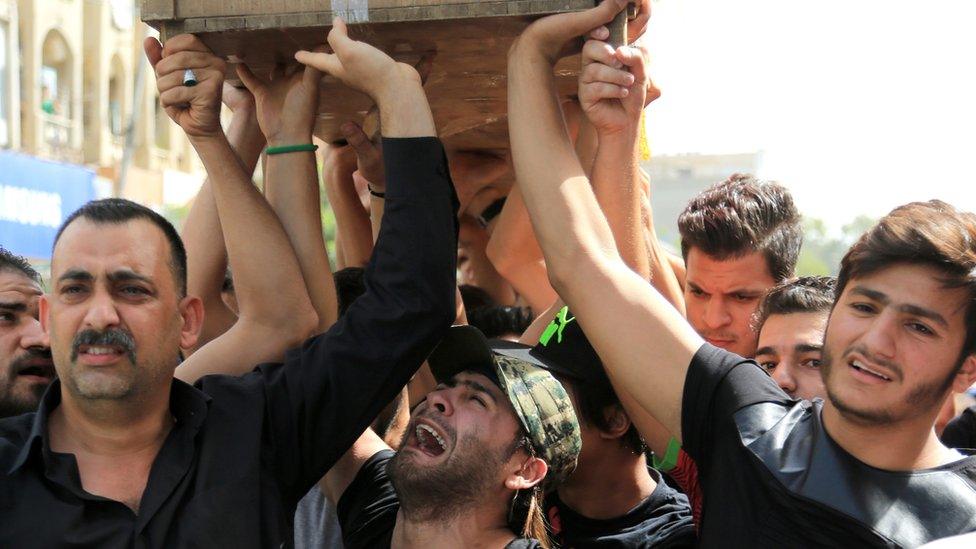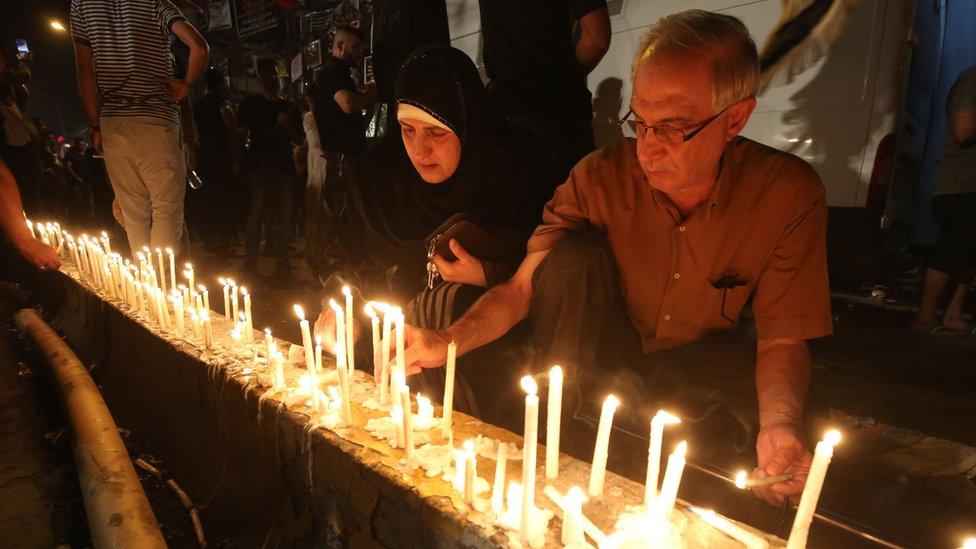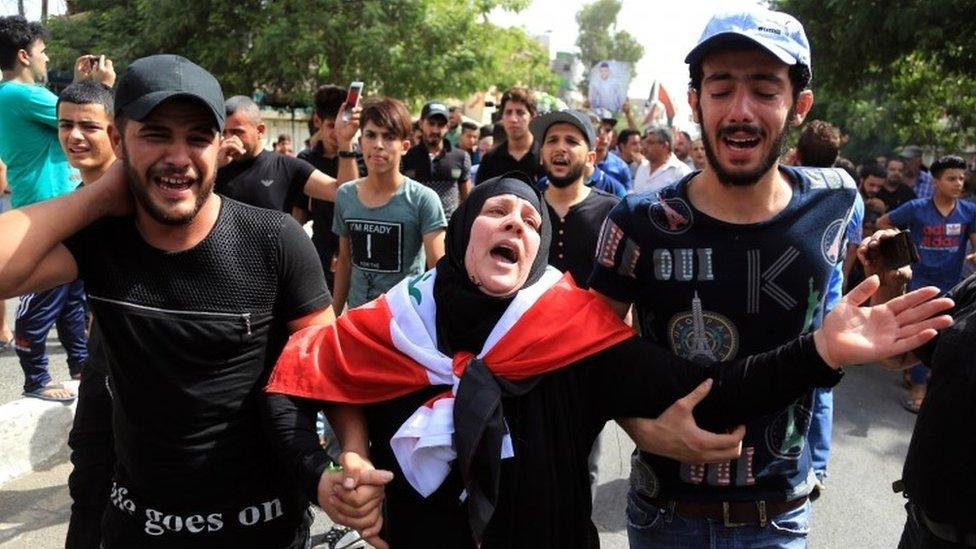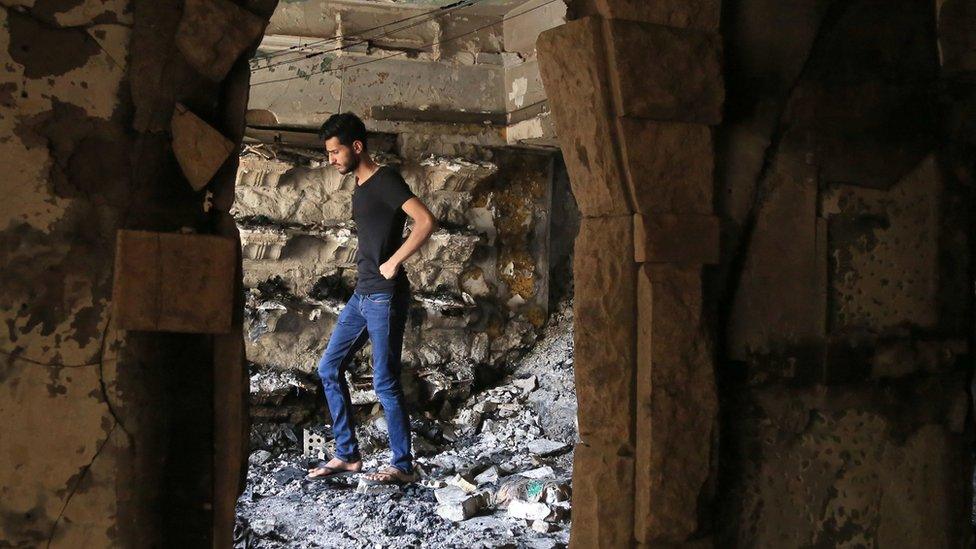Iraq sees worst bombing since invasion with 250 deaths
- Published
Jeremy Bowen reports: "People are furious that jihadists seem to be able to bomb Baghdad at will"
The death toll from Sunday's suicide bombing in the Iraqi capital, Baghdad, has risen to 250, the Iraqi government says, making it the deadliest such attack since the 2003 US-led invasion.
A lorry packed with explosives was detonated in the Karrada district while families were shopping for the holiday marking the end of Ramadan.
So-called Islamic State (IS) has said it carried out the suicide attack.
An earlier estimate for the attack had put the toll at 165.
Iraq remains under an official state of mourning following the bombing.
The destruction of the area was all but complete. Bewildered local residents have held candlelight vigils and prayed for peace.

Major attacks in Iraq since 2003

Mass graves were discovered near Camp Speicher after Iraqi government forces recaptured the area
3 July 2016: Islamic State bombing in Baghdad kills 250
August 2014: IS kill hundreds of minority Yazidi men and boys in Nineveh province, north-west of Baghdad
12 June 2014: Up to 1,700 military recruits are killed by IS at a former US base, an incident known as the Camp Speicher massacre
19 August 2009: Two car bombs near the Green Zone in Baghdad kill at least 155 people
14 August 2007: Multiple suicide bombings targeting the Yazidi community in northern Iraq kill more than 500 people
23 November 2006: More than 200 people killed as six car bombs detonate in the Sadr City neighbourhood of Baghdad

Engulfed in flames
Scores of people were also injured but most have been released from hospital, according to the Iraqi health ministry.
The ministry said those critically injured had been sent abroad, without giving further details.
The bombing in a mostly Shia Muslim area just after midnight came a week after Iraqi forces had recaptured the city of Falluja from IS.

The funeral of bomb victim Akram Hadi, 24, took place on Tuesday

Iraq declared three days of official mourning following the attack
Reports said a lorry had been packed with explosives and left near the Hadi Center, popular with shoppers.
The powerful blast engulfed the area in flames. Such was the chaos it took days for the scale of the attack to become clear.

Hope blasted away: Jeremy Bowen, BBC Middle East editor, Baghdad
Saddam Hussein's regime was harsh, and it could be murderous. He led the country into a series of disastrous wars and brought crippling international sanctions down on their heads.
But with the benefit of 13 years of hindsight, the world that existed before 9 April 2003 seems to be a calmer, more secure place. They have not had a proper day of peace since the old regime fell.
As for democracy, many I have spoken to believe the hopelessly sectarian political system is broken. At least, they say, law and order existed under Saddam.
Some hoped things might get better after the army's victory over IS in Falluja. The devastating bomb attack in Baghdad in the early hours of Sunday has blasted that hope away.

The Iraqi government has been heavily criticised over the attack, with Prime Minister Haider al-Abadi met by angry crowds when he visited the blast site.
Baghdad explosion hit a very busy area
On Tuesday, Interior Minister Mohammed Ghabban submitted his resignation but it has not yet been accepted.
He described checkpoints dotted through Baghdad as "absolutely useless", according to AFP news agency.
The government has stepped up security in Baghdad and also said a group of prisoners convicted of terror crimes would be put to death in the immediate future.

The government has been criticised for failing to do more to prevent such bombings

Bodies continue to be recovered
IS follows an extreme version of Sunni Islam and has frequently targeted Shia, whom it regards as apostates.
The group has suffered a series of territorial losses in Iraq and analysts say it is increasingly resorting to insurgent tactics.